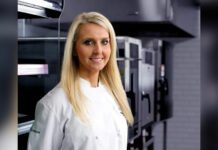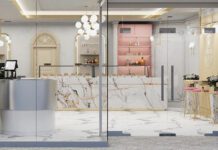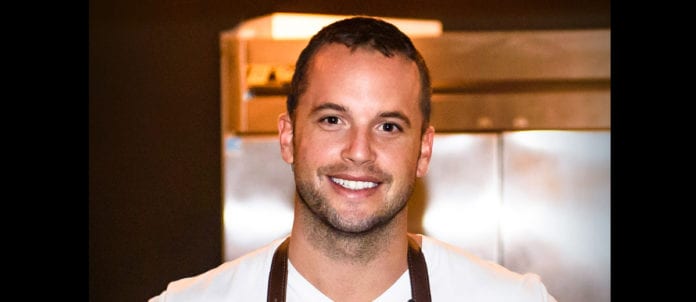Interview by Rosanna Caira
In this episode of Table Talk, Rosanna Caira, editor and publisher of Foodservice and Hospitality magazine speaks with Adrian Niman, founder and executive chef of Toronto’s Food Dudes, about the ups and downs of running a successful restaurant and catering company through the lingering COVID-19 pandemic.
In addition to the Food Dude’s catering company, Niman is also the founder of two food trucks, five restaurants and four takeout restaurants. Originally a home-based operation, the company has grown into a revered, innovative and adaptive hospitality empire.
Rosanna Caira: How did the company start, grow and get to where it is today?
Adrian Niman: It initially got started while I was at the University of Guelph, getting a degree in Hospitality and Tourism. I took this summer to go to Majorca, Spain to work at a Michelin-star hotel and that opportunity really set the tone for what I thought would be my career moving forward. I fell in love with the hospitality industry even more. I had worked at North 44 doing an apprenticeship in high school and I’d worked there for two to three years. But going to university, I still aspired to be a hockey player and once I got there, I realized I had to start coming up with another option. When I was in Majorca, I got to learn the whole front-of-house side of things because all my training at North 44 was back-of-house chef training, and I really wanted to learn the entire hospitality business. When I was working at the hotel in Spain, I was not just bartending or bussing or serving — I was carrying luggage to rooms and working with the concierge team and it was a really exciting opportunity for me to take a look at what I wanted to do moving forward. At that time, I was going to a lot of catering events in Toronto as well — bar mitzvahs, weddings, engagements — and realized there was a need and a demand for youthful energy in the catering business. I felt that all the caterers out there were outdated and lacking passion and innovation. I also realized that I was working 15 hours a day in restaurants to make $100. As much as that’s important in your learning curve, I was really ready for the next step and decided to move forward with starting my own business.
I started working in my mom’s condo doing small events for family and friends. And as the journey continued, I looked for my first bricks-and-mortar location and signed a lease for about 700 sq. ft. of space at Bloor and Bathurst streets. We started getting a few more contracts — the Marriott Residence Inn, cruise events and a corporate contract from Julie Hannaford, who’s an amazing lawyer in Toronto, to do lunch for 10 lawyers, Monday to Friday, where they gave me the freedom and creativity to do whatever it is I wanted within a budget. The company just kept growing from word of mouth. And from that kitchen, we moved to another kitchen and from that kitchen, we moved to a bigger kitchen. And before you knew it, we were getting our own 10,00-sq.-ft. commissary and I had 50 employees.
At the time, I was down in Florida with my wife and we went to a food-truck rally. Two hours later I’d purchase our first food truck. People still look at us as pioneers of the food-truck world and though food trucks have been our primary business, it’s a very small piece — revenue wise — of what we do. But it’s really humbling to know that because of how great our food was off the truck and the brand recognition from being on the street in those early years, that people still know us as a food-truck company — even though we do 2,500 events a year for catering and more than 250 weddings.
Along the journey, we wanted to diversify ourselves and prove to people that we weren’t just your average catering company. We wanted to build a hospitality group so we opened our flagship restaurant, RASA. A lot of my staff aren’t necessarily driven to work in catering and were driven to work in restaurants so, as you grow a business, you have to listen to your staff. From there, we opened a quick-service concept called Pantry, which now has four or five locations. We have a hot window and cold window and you can mix match your combo, as you see fit. Our most successful location until the pandemic hit was at Commerce Court in downtown Toronto, which was serving 600 to 700 people at lunch a day.
RASA was doing so well and our team was excelling so we knew we had to open up another restaurant to not lose any of our top staff, or else they were going to move on to other opportunities where they could take on a head chef or management role. And we opened SARA, which has also been quite celebrated and doing very well. Along the way, I partnered up with Matt Blondin, who’s one of the best chefs in the country, in my opinion, and he wanted to start focusing on a quick-service concept. He was really passionate about pizza so we opened Blondies, which now has five locations (working on number six) with lots of expansion plans.
There’s been so much more along the journey, but that’s an overview of where we’re at and what’s happened in the last 15 years.
RC: What was it specifically that made you want to get into hospitality through the catering aspect?
AN: When I worked at North 44, it was doing a ton of catering so I got to look at that field and see what a different business model it was. For example, you know exactly how much you’re making before your event even starts — you can you can control the uncontrollable. And that was a huge thing, being able to control profit margins, labour and food. Whenever you’re doing an event, working off site and you don’t have the facilities you would at a restaurant, from a business standpoint, it’s much more lucrative. It’s not as attractive as working in a restaurant; it’s not as an influential, but our goal, since we launched Food Dudes — and why I called it Food Dudes — was to show that catering can be cool, catering can be fun. And I appreciate you calling us an empire — 75 per cent of that empire is driven by catering and events. That’s our main business and all the other projects along the way are long-term investments — quick-service concepts that we plan to hopefully be able to sell one day — or they’re passion projects where they’re incubators to create like RASA and SARA. That’s how I look at it and how I’ve always envisioned it.
RC: How did you deal with COVID-19? What did that do to your business and how you moved forward?
AN: I just got hammered the last 14 months. There was an opportunity last summer for patios to re-open and in the event business, we were able to do about 25 per cent events. But just so people understand, it’s a volume business in catering — you need to be serving hundreds and hundreds of people for those higher profit margins I mentioned earlier to exist. People will give us a deposit, for an example, for 200-person wedding. And they would then move forward because they want to get on with life. So, they end up, unfortunately having to get rid of 80 per cent of their invites and move forward with the wedding. But we would do these weddings and owe them money back because we take a 25 per cent deposit and the revenue wasn’t even 25 per cent. So, it put us in a really tough position and my business partner, Lindsay Klein, did an amazing job helping me manage the bank account and the cash flow during that time. But I would say the event industry absolutely crumbled the last year. And there’s been no talk this year of when things are going to turn back. So even weddings we had scheduled for 2020 are now moving to 2022.
What we did right off the top was launch something called From Scratch to Go, a program that was going to help the medical workers. The Toronto community supported us so much, and I’m so grateful, and we were able to help out a lot of medical workers. We then came up with a concept called Fare — an experiential concept where we do gifts such as breakfast in bed, date night, dinner parties, Valentine’s Day. We did a Mother’s Day campaign and we’re going to do a Father’s Day campaign. We did a movie night, realizing that people were at home when they were bored and looking to be able to give gifts to other people. And along with that, we offered groceries, realizing that people probably didn’t want to cook, or if they did want to cook, maybe they wanted some of our famous condiments. So, we launched Fare in the fall and that that did, and has done, extremely well. Our team at Food Dudes has done an incredible job with that.
We did takeout for basically a year and it was during the last lockdown that we decided to listen to our staff and say, we’re going to give them a 28-day break to do their own concepts and pop-ups at RASA, which has had a lot of success and given them the opportunity to be creative and innovative. And we have no plans to be doing takeout anymore at RASA it’s a fine-dining restaurant. Our Blondies business absolutely skyrocketed. The pizza business skyrocketed up 25 to 30 per cent during the pandemic, which was an amazing blessing for us. That’s how we’ve kind of made it through the last year.
The government hasn’t given us any consistent leadership to open and close, open and close. If you look at places that had success in the world, with lockdowns, they really did a hard lockdown. And when they opened up, they opened up and they didn’t keep opening and closing — it’s really disheartening for our industry.
RC: We’re going to be on hold for quite a long time, given that we probably won’t be able to have large group meetings for a while, so are you just putting the catering business on hold for the rest of the year?
AN: We’ve been talking about it a lot with our executive team and our partnership group. Last summer they allowed, I think it was 50 to 75 people in Toronto outside and 25 inside, and then outside of Toronto, the numbers were slightly larger than that. So, we’re going to go off of the basis that it will probably be similar to last summer. The trend we’re seeing with people booking events with us — late fall, early winter and next summer — is just gangbusters. We’ve got to assume by next summer that we’ll be able to do weddings for 200 plus again. We control the food-and-beverage contract for the Honda Indy as well as the food-and-beverage contract at Hotel X and we’ve seen weddings be delayed and pushed back at the hotel and the Honda Indy has had to cancel its event again this summer, which is crazy, because it’s an outdoor event for the outdoors. I really don’t understand certain things about the government’s choices. But obviously, they’re getting medical advice and we have to trust that medical advice and trust our government is making the right decision for us. And I’m one of those people that believe that that that is the case. As frustrated as that is for us as entrepreneurs and business leaders and hospitality workers, there is light at the end of the tunnel — you can see what’s happening in the States right now, how they’re opening back up and hopefully we follow suit.
RC: This past year has taught all of us so many different lessons. What has it taught you about yourself?
AN: When everything’s been taken from you, things are out of your control and there’s nothing you could have done to stop it, you really have to surrender to the situation, have an open heart and an open mind. And you need to be there for your staff and as a leader in the hospitality industry. It’s my duty to stay strong.
We’ve pivoted so much during the last 14 to 15 months and I’m so proud of my team that stuck by me during this time. I owe it to them after this to continue to inspire and give them greater opportunities that will lead to not just financial growth, but personal growth. This time around, let’s not take it for granted. And there’s no need to be frustrated — no one’s angrier or more frustrated than I am but I’ve done a lot of work on myself these last 15 months. And I look at people that are in way worse situations than us, who aren’t going to be able to re-open their restaurant, or aren’t going to have a job to go back to and those are the people I want to fight for and stand up for. Realizing we’re the lucky ones and that as hard as it’s been on us and as big as the swings have been, there’s a lot of people that are in a way worse situation and we have to do everything we can to support and help them get through this tough time.
Click here to listen to the entire podcast


















